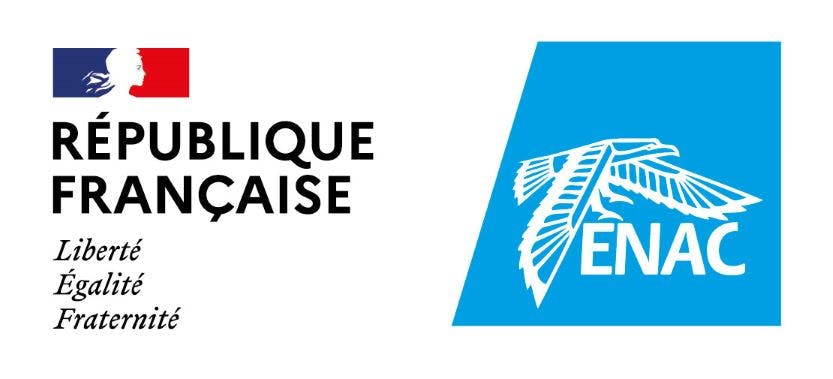PhD Thesis : Navigation using 6G Non-Terrestrial Network (NTN) communication systems
CDD
01/05/2025- 30/04/2028
Description
Founded 70 years ago, ENAC, École Nationale de l'Aviation Civile, is Europe's largest aeronautical Grandes Écoles or university. It provides initial and advanced training for managers and key players in the civil aviation industry: engineering, air navigation, piloting, airport management, research, expertise and international development.
ENAC is a public scientific, cultural and professional establishment, under the supervision of the DGAC (Direction Générale de l'Aviation Civile ), the French civil aviation authority.
Mission
This PhD thesis is co-funded by THALES ALENIA SPACE and is expecting a half scholarship from the public project EMERGENCE 2024 (the launch of the PhD thesis depends on the obtention of this second half-scholarship).
The proposed PhD thesis is in the field of Navigation using 6G Non-Terrestrial Network (NTN) communication systems.
Since the introduction of 5G positioning, non-terrestrial networks (NTNs) based positioning has garnered significant interest due to its numerous applications, including emergency services, lawful intercept, and charging and tariff services. NTN is defined as a network that includes non-terrestrial flying objects such as High Altitude Platform Systems (HAPS), air-to-ground networks and satellite communication networks. Moreover, nowadays, there is an interest in integrating satellite networks with 6G systems since 6G NTN has the advantages of service continuity, scalability and availability, which will support 5G systems to achieve their challenging use cases. Therefore, the analysis of navigation performance using 6G NTN communication systems is a very promising complementary alternative to current Global Navigation Satellite System (GNSS). This PHD thesis will tackle low-earth-orbit (LEO) constellation systems for positioning to provide navigation and location verification services, which requires a fairly coarse location estimate.
In 3rd Generation Partnership Project (3GPP) Release 17, UE positioning in NTN is performed with the existing GNSS. However, using GNSS jointly with NTN communication services has one important drawback; the UE device must have two separate receivers or dedicated chipsets to process different two signals, one for positioning (GNSS receiver) and another one communication (NTN receiver). Therefore, the evolution of the NTN communication systems to enable reliable positioning either in standalone mode or in cooperation with GNSS is a very interesting solution. Indeed, first findings suggest that NTN technology has significant potential to provide accurate positioning of UEs in scenarios where GNSS signals may be unavailable.
The aim of this thesis is thus to investigate the use of 6G NTN as an alternative positioning solution; moreover, this PhD thesis will focus on the signal processing part in order to build a solid base which should allow a more precise analysis of the PVT performance and potential algorithms.
The following tasks are proposed:
1) To evaluate potential positioning signal candidates for 6G NTN systems (from a limited number of options provided by 3GPP projects/contributors) and to analyze the impact of different signal parameters on the positioning accuracy. To this end, New Positioning Reference Signal (PRS) based OFDM waveform characteristics in 6G will be investigated (NTN positioning using different configurations of PRS is presented).
2) To analyze the impact of different satellite parameters and deployment scenarios on positioning accuracy. The effect of uncertainty in the satellites positions will be investigated. The Poc (Proof -of Concept) will be implemented and will be based on 6G positioning in Third Generation Partnership Project (3GPP) Releases standardization.
3) To propose acquisition and tracking algorithms suited to the particularities of LEO satellites as well as 6G signals (OFDM waveforms, etc.). For example, how fast Doppler variations affect the application of matched filter (or correlators); analysis of the performance of typical acquisition algorithms such as the Van de Beek algorithm, etc. [1][2][3].
The propagation channel will be recovered from the on-going work of the 3GPP.
[1] Paul Thevenon, PhD Thesis "S-band air interfaces for navigation systems: a focus on OFDM signals", 2010
[2] Damien Serant, PhD Thesis, "Advanced Signal Processing Algorithms for GNSS/OFDM Receiver", 2012
[3] Anne-Marie Tobie, PhD Thesis, "Hybridation GNSS/5G pour la navigation en milieu urbain", 2021
Profil
Master’s degree in electrical/telecommunications/electronic engineering (or equivalent) with background in estimation theory and signal processing. Knowledge in GNSS and aerospace systems will be appreciated.
ENAC facilitates the integration of workers with disabilities
